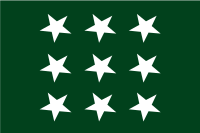Pakistan National Alliance
Pakistan National Alliance پاکستان قومی اتحاد | |
|---|---|
TeI) | |
| Founded | 5 January 1977 |
| Dissolved | 24 January 1978 |
| Ideology | Conservatism Capitalism |
| Political position | Right-wing |
| Colors | Green |
| Slogan | Nizam-e-Mustafa (1977) |
| Party flag | |
 | |
The Pakistan National Alliance (
Despite each parties standing with a different ideology, PNA was noted for its large physical momentum and its right-wing orientation, originally aimed to oppose Prime Minister
History
The
Early calls for the elections was an idea to not to given time to the opposition to make decisions and arrangements for the forthcoming elections.
On social views, the implementation of Islam was its primary election slogan. They promised to enforce Islamic laws "
| PNA Divergence | ||||
|---|---|---|---|---|
| Political parties | Presiding leadership | Position | Color | Fate |
Jamaat-e-Islami (JeI) |
Muhammad Tufail |
Right-wing | In alliance with Zia | |
| Pakistan Muslim League (PML) | Pir Pagara |
Centre-right |
In alliance with Zia | |
Tehrik-e-Istiqlal (TeI) |
Asghar Khan | Right | In alliance with Zia | |
| Jamaat Ahle Sunnat (JaH) | Ahsan llahi Zaheer | Right | In alliance with Zia | |
| Jamiat Ulema-e-Pakistan (JUeP) | Shah Ahmad Noorani | Right | In alliance with Zia | |
Milli Awami Party (MAP) |
Mahmood Achakzai | Left | In alliance with Zia | |
| Balochistan National Party (BNP) | Akbar Bugti | Left-wing | neutrality with Zia | |
| Awami National Party (ANP) | Abdul Vali Khan |
Left |
In opposition to Zia | |
| Pakistan Democratic Party (PDP) | Nawabzada Nasrullah Khan |
centre-right |
In alliance with Zia | |
Right-wing populism and violence
At this platform, the modern European style-influenced forces formed an alliance with totally opposite of hard-line Islamist forces.[3] The alliance decided to contest the elections under one election symbol "plough" and a green flag with nine stars as its ensign.[3]

Contesting the 1977 elections jointly the PNA launched a national campaign against the government after the controversial and allegedly rigged results showing the Peoples Party as an overwhelming victory in the general elections.[5] The agitation caught the Peoples Party and its political scientists, by surprise and after several months of street fighting and demonstrations. Under advised by his advisers, Bhutto opened negotiations with the then PNA leadership but whether or not it would have been signed by all PNA parties or by Bhutto remains open to speculation. In a single unusual anti-Bhutto bloc, the alliance seemed to be effective when tapping a wave to remove Bhutto from government.[5]
Meanwhile, Bhutto's trusted confident and a lifelong companion dr.
Authoritarianism and PNA split
The conservatives and Islamist fronts went to General
Controversy regarding foreign support
On 5 July 1977, the
Further
In 1998, Benazir Bhutto publicly announced her belief that her father was "sent to the gallows at the instance of the superpower (most believe it to be USA) for pursuing the nuclear capability,[13] though she did not disclosed the name of the foreign power.[13]
Alliance members
The Alliance unusually consisted of 9 parties, with completely different ideologies, backgrounds, and political goals. As of today, the parties have been separated from its original bloc, and formed different parties with different names. And, as of the 1970s, the fronts and parties that Bhutto and his colleagues were facing are listed below in their respective categories:
- Jamaat-e-Islami (JI)
- Jamiat Ulema-e-Islam (JUI)
- Jamiat Ulema-e-Pakistan (JUP)
- National Democratic Party (NDP)
- Balochistan National Party (BNP)
- Muslim League (Qayyum) (ML-Q)
- Muslim League (Functional) (ML-F)
- Democratic Party (PDP)
- Tehreek e Istaqlal(TI)
See also
- Islami Jamhoori Ittehad
- Politics of Pakistan
- History of Pakistan
- List of political parties in Pakistan
- Movement for Restoration of Democracy- a nine-party alliance formed to oppose Zia-ul-Haq
References
- ^ Navaz Sharif – A man between enemies Archived 11 August 2011 at the Wayback Machine
- ^ a b c Country studies US. "History of Pakistan Peoples Party and the Left in Pakistan". Country studies US. Retrieved 19 May 2013.
- ^ a b c d e f "1977 General elections and Right wing populism". Story of Pakistan press. June 2003. Retrieved 19 May 2013.
- ^ ISBN 978-1576077122.
- ^ ISBN 978-0816061846.)
{{cite book}}: CS1 maint: multiple names: authors list (link - ^ ISBN 0870032143.
- ^ ISBN 0754644340.
- ISBN 0275968774.
- ^ During Bhutto's five years in Pakistan's helm, Bhutto had retained an emotional hold on the poor masses who had voted him overwhelmingly in 1970s general elections. At the same time, however, Bhutto had many enemies. The [socialist economics] and nationalization of major private industries during his first two years on office had badly upsets the Business circles... An ill-considered decision to take over the wheat-milling, rice-husking, sugar mills, and cotton-gaining, industries in July 1976 had angered the small business owners and traders. Both leftists— socialists and communists, intellectuals, students, and trade unionists— felt betrayed by Bhutto's shift to centre-right wing conservative economics policies and by his growing collaboration with powerful feudal lords, Pakistan's traditional power brokers. After 1976, Bhutto's aggressive authoritarian personal style and often high-handed way of dealing with political rivals, dissidents, and opponents had also alienated many.... Quoted by the United States on Bhutto's and PNA alliance tug of war politics
- ^ "I [Ramsey Clark] do not believe in conspiracy theories in general, but the similarities in the staging of riots in Chile (where the CIA allegedly helped overthrow President Salvadore Allende) and in Pakistan are just too close, Bhutto was removed from power in Pakistan by force on 5 July, after the usual party on the 4th at the U.S. Embassy in Islamabad, with U.S. approval, if not more, by General Zia-ul-Haq.[119] Bhutto was falsely accused and brutalized for months during proceedings that corrupted the Judiciary of Pakistan before being murdered, then hanged. As Americans, we must ask ourselves this: Is it possible that a rational military leader under the circumstances in Pakistan could have overthrown a constitutional government, without at least the tacit approval of the United States?" Quoted by former U.S. Attorney General Ramsey Clark
- ^ Ahmad, Ghoofor (2011). Phir Marshal Law Agya. Karachi, Sindh Pakistan: Books and publishing in Pakistan.
- ^ From the Newspaper (25 October 2012). "Asghar Khan and PNA's funding". Dawn Newspapers. Retrieved 20 May 2013.
- ^ a b Malick, Nasir Malick (10 May 1998). "Benazir vows to fight on people's side". DawnWireService (DWS). Retrieved 17 November 2011.
